You Read It First In Vintage Paparazzi
Home-town Girl: Barbara Hale never forgets her old school chums in her home town of Rockford, Illinois. Hearing that one friend had progressed with her art work, Barbara had her send on three of her paintings which she promptly sold because, as Barbara told her over the phone, they were excellent paintings that showed greater promise. Incidentally, Barbara has gone in for ceramics and designed and baked a beautiful ceramic doll for her daughter’s Christmas gift.

About People: The Humphrey Bogarts had a ten-day whirl in New York, but Bogey was a little relieved when it was over—for a comical reason. Lauren, along with thousands of other women, got a crush on Ezio Pinza of “South Pacific” and while Bogey joined in the general kidding, he wasn’t any too happy. When Lauren went backstage to greet Ezio, Humphrey pretended to have a concealed mike in the dressing room. “I gotta be sure about this,” he kidded . . . Jerome Courtland is the despair of the teen-age belles since he took up spear fishing. The girls claim Jerome won’t take off his diving helmet long enough to go square dancing anymore . . . Stewart Granger, the most popular Englishman ever to hit Hollywood (and not just because his real name is Jimmy Stewart, either), dated all the pretty girls while their regular beaus fumed . . . Audrey Totter phoned Cal to say goodbye before setting off on a hospital tour and a two-weeks stay in New York. Audrey claims she’s heart-free, but something in the way she spoke Greg Bautzer’s name made us think—well, anyway, it took an attorney to outdo movie lovers when it comes to getting the gals . . . Brian Donlevy brought his little daughter over to Joan Crawford’s house to share a birthday. Brian, who is Joan’s latest admirer, spends most of his spare time on Crawford’s set of “The Victim.”
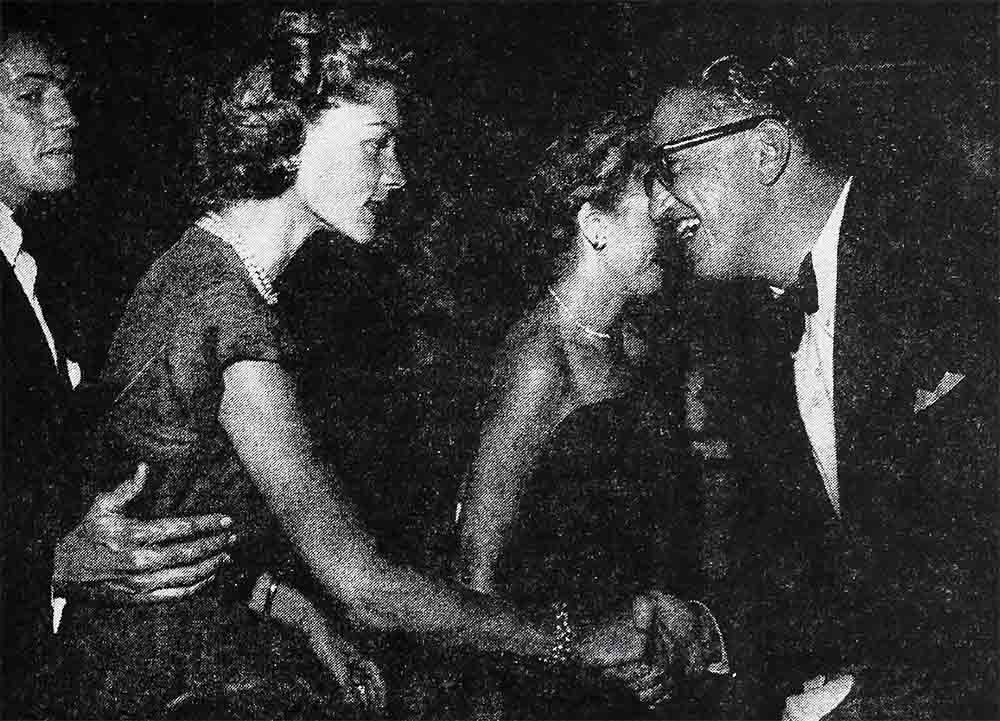
June and Dick: There’s a happy, relaxed air about “The Reformer and the Redhead” set that’s a sure tip-off that all goes well with the cast. And since the stars are June Allyson and Dick Powell, this is good news. The day we visited the set, Dick was attempting a political speech for the camera, while June did her impish best to distract him. The camaraderie between them was delightful.
“I have a new respect for this little mite,” Dick told us. “This morning she was supposed to slap Helen Freeman for a scene and what happens ? Helen goes to the hospital with a bloody nose. Me, I’m keeping away from her.”
We asked June about working with her husband. “I never think of Richard as my husband when we’re playing a scene,” she said. “I just think, why here’s one of the nicest actors I ever worked with.”
The Powells are planning to adopt another baby and, what’s more, they’d like to make more pictures together.
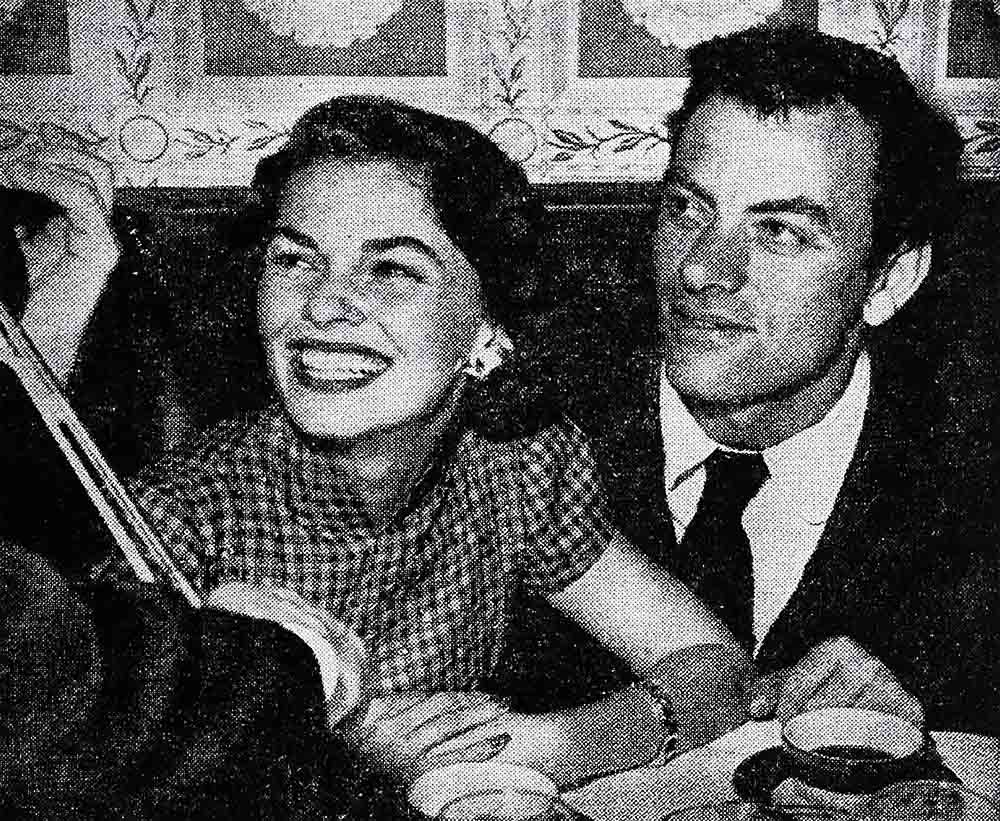
The Walkers: The three went house-hunting together—Bob Walker and his sons Bob and Mike. In Brentwood, they found exactly the place they like, a rambling house with lots of grounds and a barn for horses. So the three moved out of the Jennifer Jones house and into their own. Every free moment of time, the three don blue jeans and work around the place, clearing- the grounds and even painting the barn. Bob is a devoted father and the boys adore him. Twice weekly their mother phones them from Europe. When she returns the lads will spend part of the time with her.
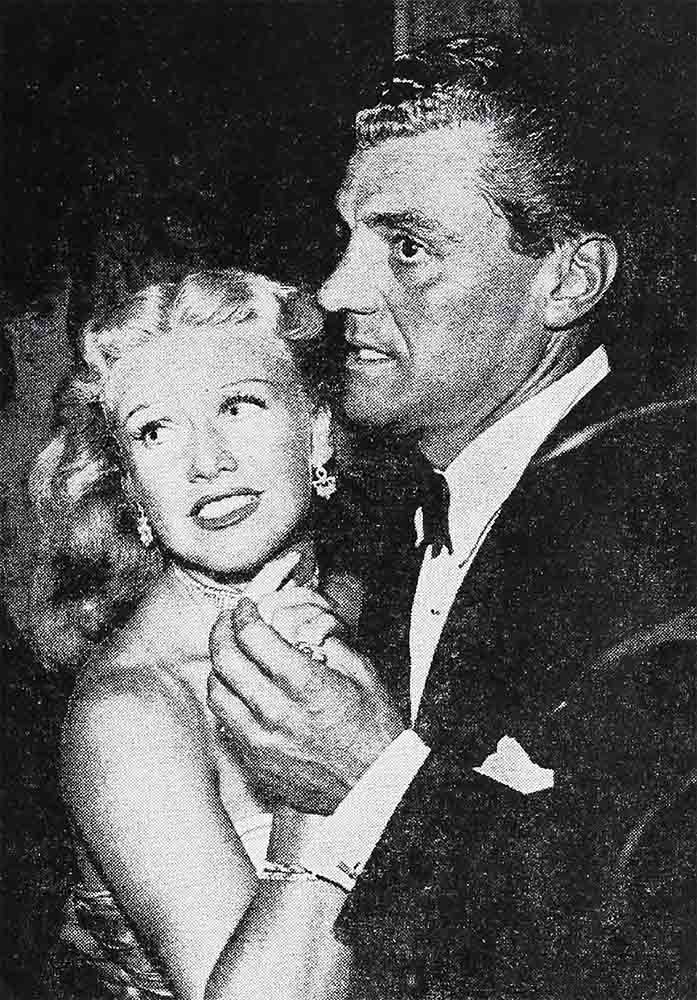
Congratulations: It was back in 1934 that the Lux Radio Theatre first went on the air. Now they’re celebrating, with reason, their fifteenth anniversary. For through these years, they’ve come to be one of the outstanding programs on the radio for the splendid plays they’ve produced and the top performers who’ve appeared in them—Helen Hayes, Ethel Barrymore, W. C. Fields, Tallulah Bankhead, Irene Dunne, Cary Grant and a host of others. The “risky experiment” of fifteen years ago has become a real highlight in our radio life. A yearly feature of the Lux Theatre is the dramatization of the picture that is chosen as the winner of Photoplay’s Gold Medal Award.
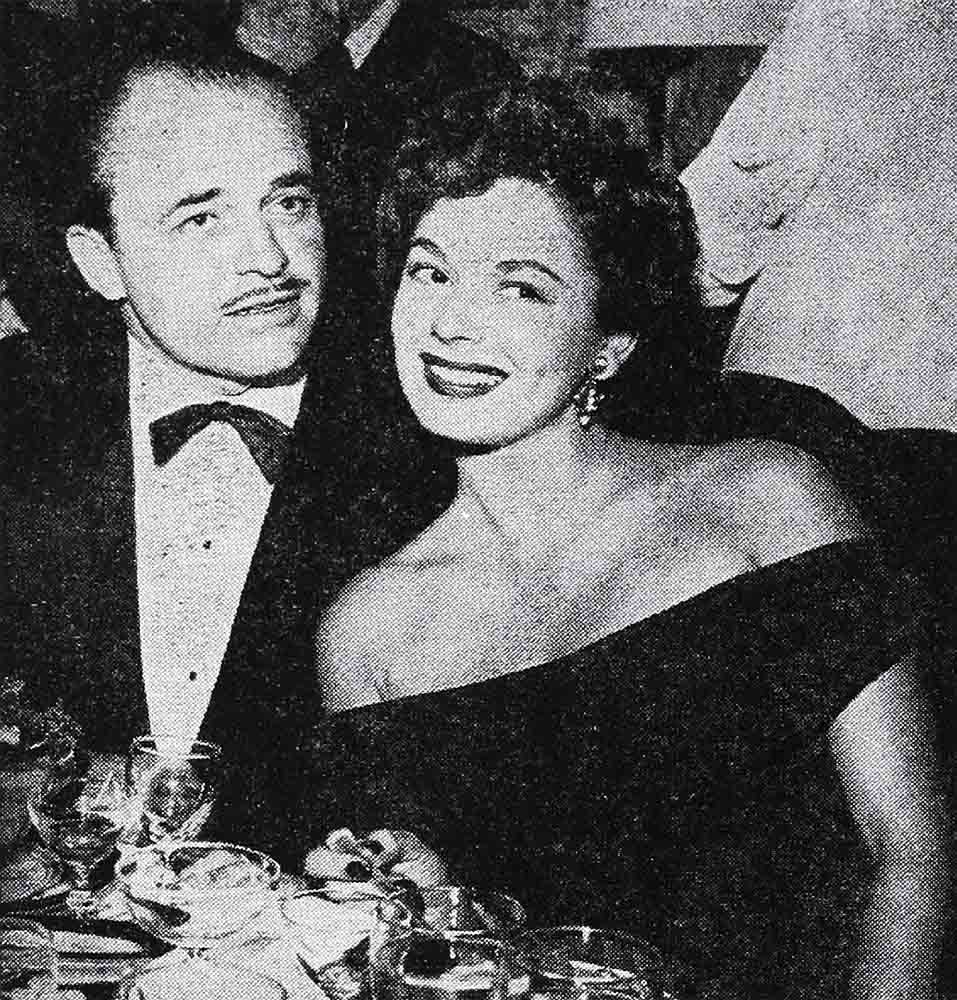
Hollywood’s Worst-Dressed Stars: When secretaries from various studios selected Hollywood’s worst-dressed male stars, they really started something. Some took it seriously and sought to have their personal press agents refute the claim. Others, Frank Sinatra among them, openly kidded the fact they were numbered in the list. The singer even quoted, on his radio show, the secretaries’ remarks that Frank looked as if he had built-in midgets holding up his shoulder-pads.
Howard Duff merely laughed at the gals’ accusations that he looked like an exploding bomb. “They must have seen me coming in one morning after two zombies,” he laughed. “You certainly feel like a bomb had gone off somewhere around you.” But Van Heflin, whom the gals accused of still wearing the same suit he wore back in “The Philadelphia Story,” hotly declares it isn’t so. “I have from six to eight suits which I vary in pictures,” he says. Frankly, Van always looks to Cal as if he were about to play a character part off screen. Why should he care about the latest cut anyway, a guy that can act like that.
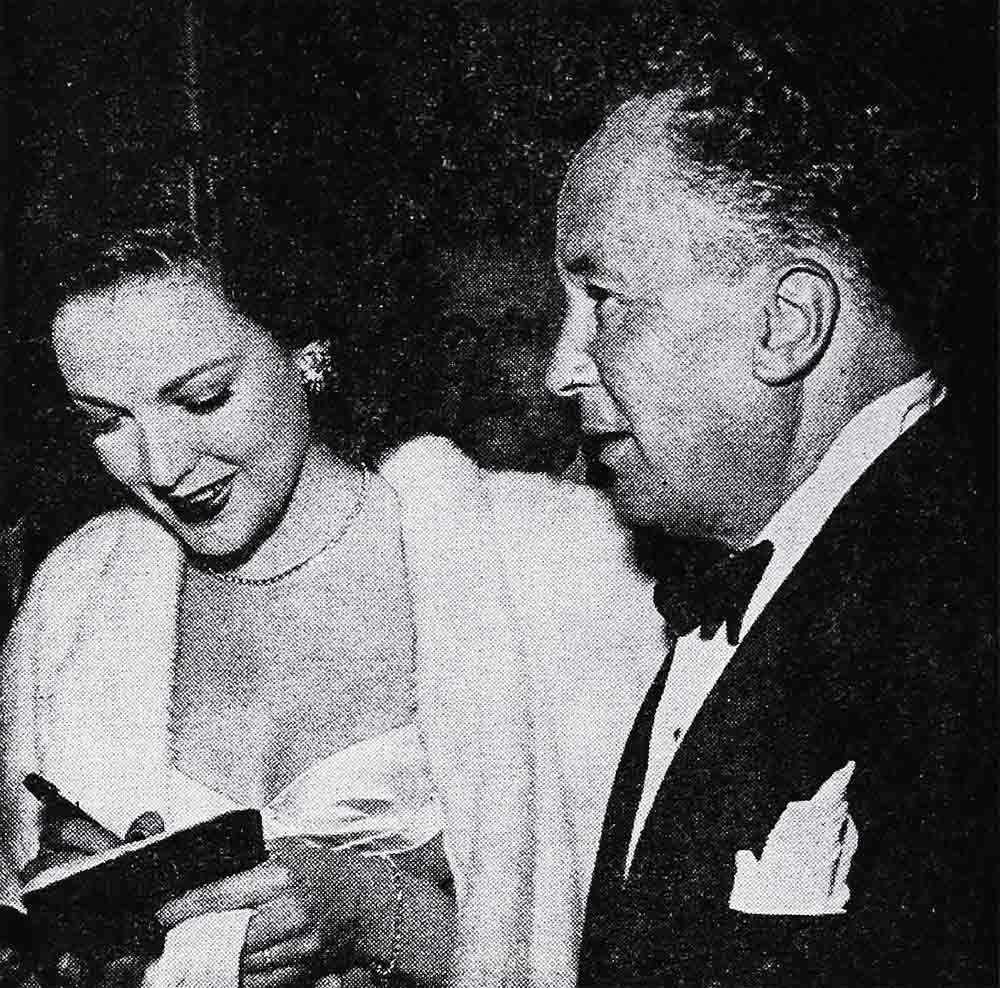
Mrs. Macdonald Carey had more fun than a barrel of monkeys when the gals chose Carey among the worst-dressed, with the statement that Carey was still wearing Marine Corps fatigues. “Now, maybe he’ll dress up more,” she said, “and put away those slacks and tweed jackets.” Carey only scowled and said he didn’t even know where his Marine Corps fatigues were, and what were they talking about.
“Jimmy Stewart is like a tweed weed and Robert Cummings probably wears nightshirts, the gals said. To which Jimmy replied, “Well, as long’ as they don’t call me a bad weed, I guess it’s all right,” while a close friend of Cummings snapped, “Maybe it’s sour grapes Maybe the gals are jealous because they’ll never know about Bob’s bedtime attire.”
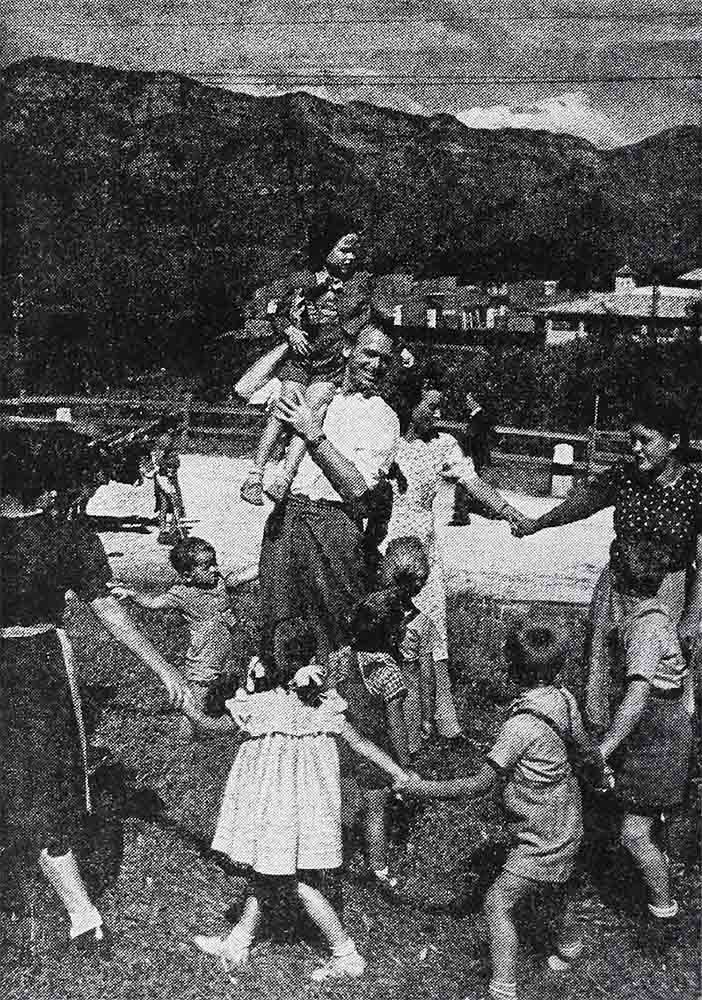
The real shocker came with the selection of Adolphe Menjou, who usually appears on best-dressed lists. “Vests went out with bloomer bathing suits,” they said about dapper Adolphe. The town instantly divided itself into two camps on the Menjou selection. The more conservative group insisted Adolphe did not dress according to Hollywood standards, but according to London’s Bond Street where vests were quite proper. The younger set screamed, “Phooey,” and pointed to several well-dressed English actors in town who are never seen wearing vests.
Vic Mature, whom they accused of not even wearing socks with his casuals, shrugged, and asked why the fuss about sox appeal when sex appeal counts at the box office. “Besides,” Vic is quoted as saying, “who looks at my ankles with Grable on the lot?”
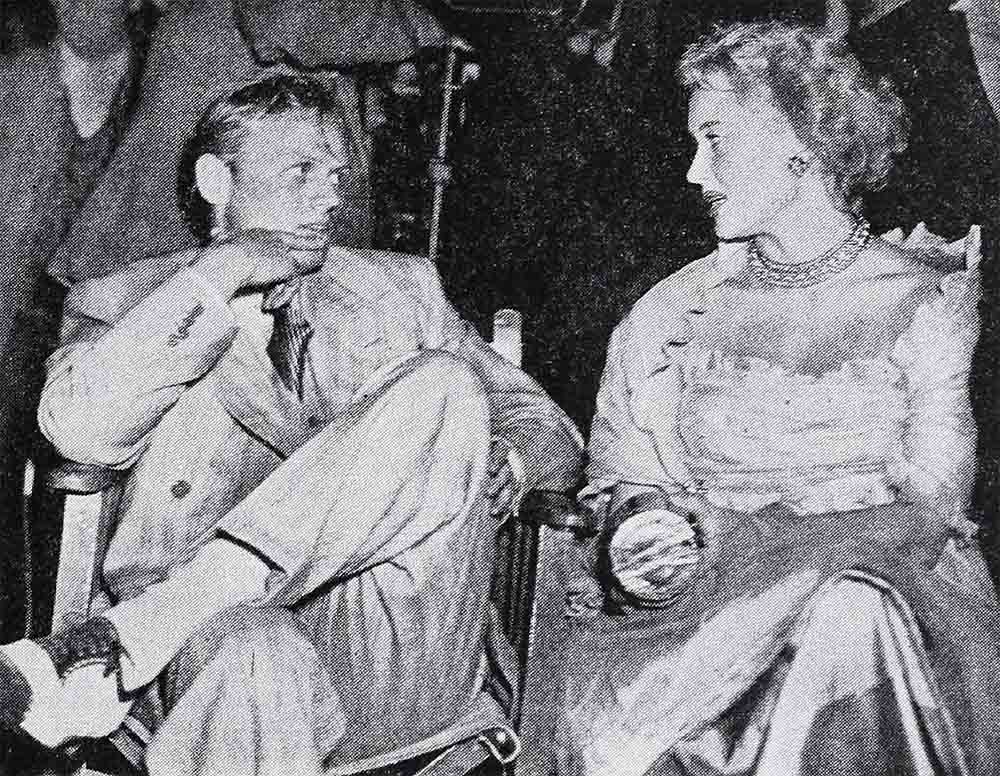
Get out the Vaccine: Donald O’Connor walked into a popular Valley restaurant at lunch time wearing small-pox makeup. As a result, Donald can write in his memoirs that for a hot ten minutes he was the world’s most unpopular guy.
Customers in Valley eating places are used to seeing actors in all sort of riggings and make-up, and at first, paid scant attention to the actor done up with the plague for a Technicolor scene in “Double Crossbones.”

But for a few curious stares, there may have been nothing to it if actor John Emery, seeing a chance to kid Donald, hadn’t begun staring at the actor’s face from his table across the way. Soon, his intense staring drew stares from out-of-town tourists who began to express uneasiness. John’s face registered everything from surprise to horror and soon every eye in the room was on John as he summoned the waiter and asked to be moved to another table.
Customers around Donald also began moving, and only in time did Donald avert a panic by leaving the place, swearing to get even with John. Knowing O’Connor, we’d say Emery will regret his little prank in a big way.
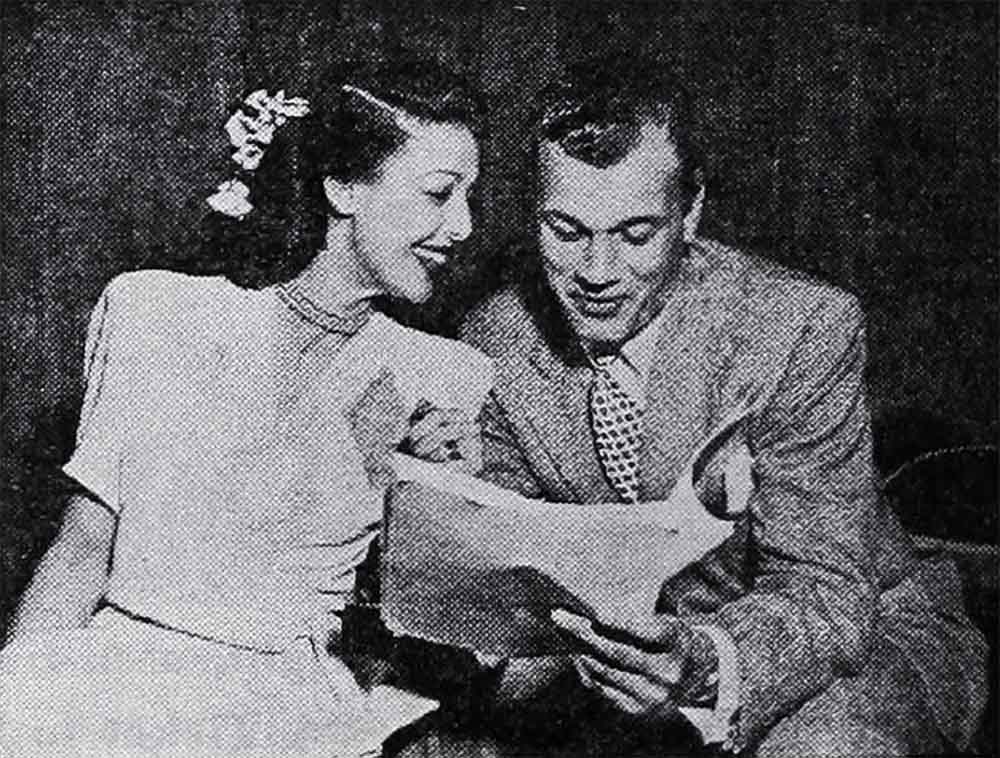
No Humor?: Uninhibited Shelley Winters, whose outspoken frankness is a tribulation to Universal Studios, dated Howard Duff during one of his feuds with Ava Gardner.
Next evening, Shelley ran into Ava. “Hey, that boy friend of yours has no sense of humor,” she said. “He asked me how I liked him in a certain scene and I told him fine, he’d used his other expression.
“And do you know something?” Shelley went on. “He didn’t laugh.”
Ava did, however.
Behind the Scenes: It wasn’t too flattering to Joan Fontaine to discover that Bill Dozier, the husband she put out of her life just before she took off for Europe, had fallen in love with Cleatus Caldwell Hutton while she was gone and hadn’t really missed her at all . . . It wasn’t that Lex Tarzan Barker didn’t love his socialite wife who divorced him, taking herself and children back to New York; it simply became more apparent to both Lex and Mrs. Barker that he wasn’t cut out to be a husband. Swinging from trees as Tarzan had nothing to do with it . . . When Jack Carson, who separated from his wife several years ago, found real love and happiness with Lola Albright, Mrs. Carson consented to a divorce. But when the day arrived, she refused to utter one derogatory word against Jack, confusing the judge by claiming she loved her husband too much to suggest he was unkind or even incompatible. As a result, Mrs. Carson returned home still married to Jack who still loves Lola who still loves him. And there, at this writing, it stands.
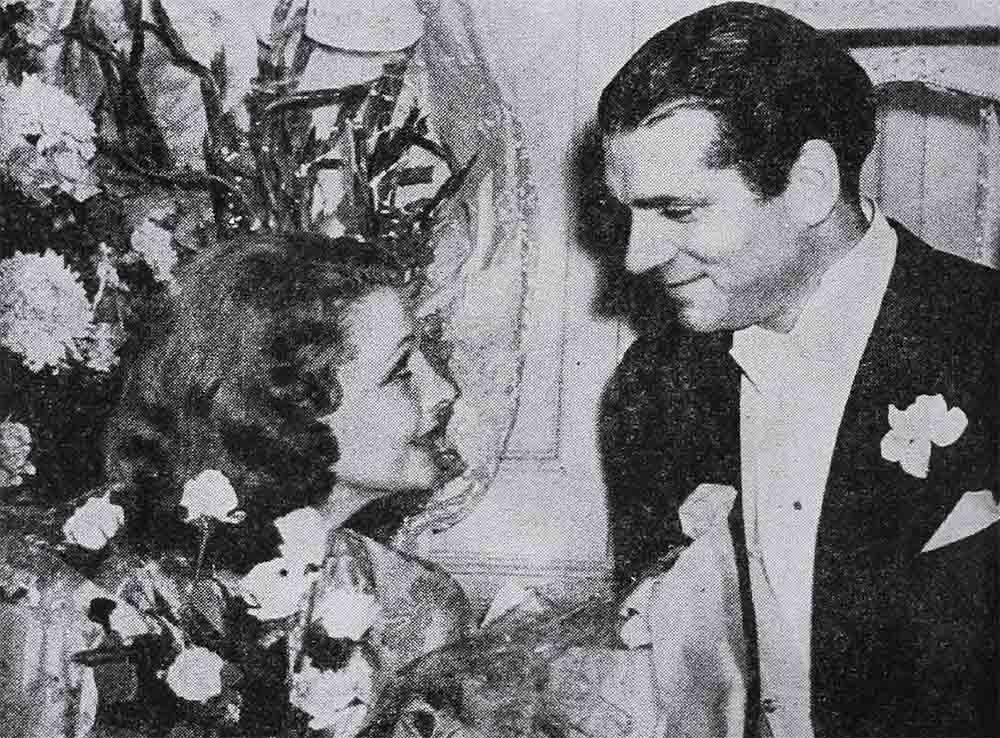
The Amazing Masons: In a huge showplace atop a Beverly Hills crest, the James Masons live in disorganized, individualized contentment. The scant furniture barely fills the huge rooms. Forgotten or neglected tea trays and tea things, where, as in “Alice in Wonderland,” it always seems to be six o’clock and tea time, are scattered about on various tables throughout the rooms. There seem to be no servants about. A family friend, one Monaghan, does what cooking gets done. When baby Portland expresses hunger, she’s handed a bottle. When sleepy, and this could be midnight or two in the morning, she’s tossed a pillow. Since diapers seem to comprise her wardrobe, she requires little laundering. She’s happy, healthy, contented. Cats roam, purr and sleep all over the place while the Masons write books and articles that most certainly get published. That an article by the Masons condemned Hollywood before they had ever seen it, bothers them not at all, now that they have seen it and love it. That they live exactly as they choose and nuts to conventions, doesn’t bother Hollywood too much. After all, this is the town of “characters,” isn’t it?
Success Story: Across a New York drugstore soda fountain, a boy and girl talked of plans ahead. But not too hopefully. After all, he was but a soda jerk and she, a movie usherette, and their dreams were big ones. But this is America, where dreams such as Betty Bacall’s and Issur Danielovitch’s can come true. Arid they did!
Betty became a model, had her picture spotted in a fashion magazine, became movie star Lauren Bacall and married Humphrey Bogart.
The minute she hit stardom, Lauren went to her boss Jack Warner, about her friend Issy, for a lot of things had happened to Issy. For one thing, he’d changed his name to Kirk Douglas, gone from soda jerk to waiter, to an AB degree from St. Lawrence University in Canton, New York, to collegiate wrestling champ, and finally, to actor.
After the lead in “Kiss and Tell,” he enlisted in the Navy and then hit Hollywood with his wife Diana Dill, his sons Michael, aged five, and Joel, aged two. After several movies, “A Letter to Three Wives” among them, the chance to play the heel in “Champion” presented itself. “Don’t do it,” his agent cautioned, “that type of role can finish you.” It only made him the hottest property in town and gave his friend Lauren that muchly coveted last laugh for the actor Warners could have had a few years ago for a few hundred a week now costs them a neat million for his contract duration.
Hello? Mr. Autry? They thought of everything when they built their new dream house far out in the Valley, except one thing, and that was a telephone. So, when Gene Autry and his wife were informed that their region was too sparsely settled for a special cable, they were stumped for only a minute.
“We’ll use the one in my car,” Gene said, and they do. Every once in a while, Gene pops out to his car and calls operator for his messages and from his car phone, Gene returns his call.
It comes in handy, too, for Mrs. Autry who sits back comfortably in the front seat and telephones the grocer and the butcher. These movie stars eventually think of everything, don’t they?
It is a quote. PHOTOPLAY MAGAZINE JANUARY 1950





No Comments